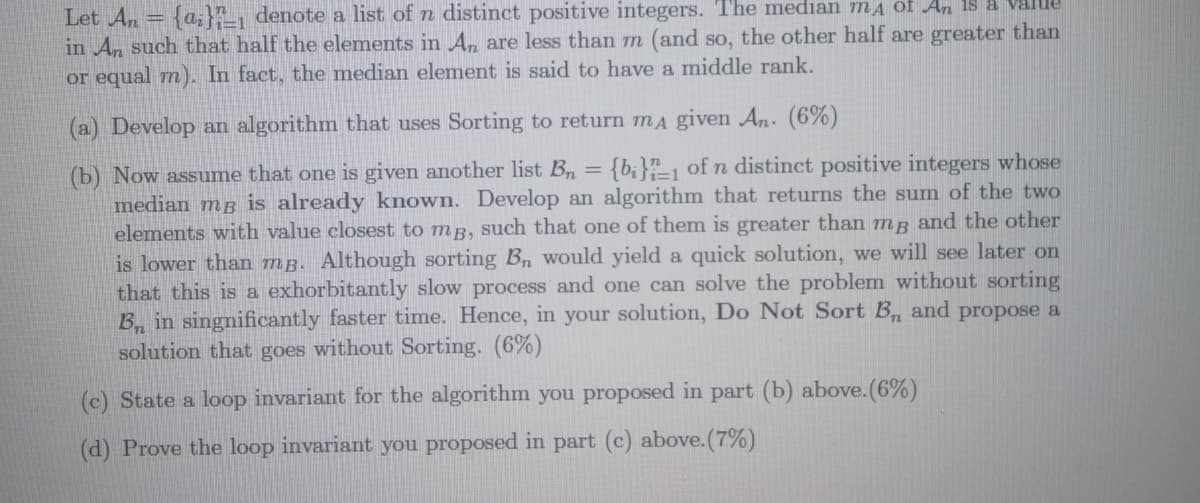Let An= {a;}, denote a list of n distinct positive integers. The median mA ÖI An Is a in An such that half the elements in An are less than m (and so, the other half are greater than or equal m). In fact, the median element is said to have a middle rank. (a) Develop an algorithm that uses Sorting to return mA given An. (6%) (b) Now assume that one is given another list B, = {b;}"1 of n distinct positive integers whose median mg is already known. Develop an algorithm that returns the sum of the two elements with value closest to mg, such that one of them is greater than mg and the other is lower than mg. Although sorting Bn would yield a quick solution, we will see later on that this is a exhorbitantly slow process and one can solve the problem without sorting B, in singnificantly faster time. Hence, in your solution, Do Not Sort B, and propose a solution that goes without Sorting. (6%) %3D (c) State a loop invariant for the algorithm you proposed in part (b) above.(6%) (d) Prove the loop invariant you proposed in part (c) above.(7%)
Let An= {a;}, denote a list of n distinct positive integers. The median mA ÖI An Is a in An such that half the elements in An are less than m (and so, the other half are greater than or equal m). In fact, the median element is said to have a middle rank. (a) Develop an algorithm that uses Sorting to return mA given An. (6%) (b) Now assume that one is given another list B, = {b;}"1 of n distinct positive integers whose median mg is already known. Develop an algorithm that returns the sum of the two elements with value closest to mg, such that one of them is greater than mg and the other is lower than mg. Although sorting Bn would yield a quick solution, we will see later on that this is a exhorbitantly slow process and one can solve the problem without sorting B, in singnificantly faster time. Hence, in your solution, Do Not Sort B, and propose a solution that goes without Sorting. (6%) %3D (c) State a loop invariant for the algorithm you proposed in part (b) above.(6%) (d) Prove the loop invariant you proposed in part (c) above.(7%)
Database System Concepts
7th Edition
ISBN:9780078022159
Author:Abraham Silberschatz Professor, Henry F. Korth, S. Sudarshan
Publisher:Abraham Silberschatz Professor, Henry F. Korth, S. Sudarshan
Chapter1: Introduction
Section: Chapter Questions
Problem 1PE
Related questions
Question
100%

Transcribed Image Text:Let An = {a;A, denote a list of n distinct positive integers. The median mA of An 15 a Value
in An such that half the elements in An are less than m (and so, the other half are greater than
or equal m). In fact, the median element is said to have a middle rank.
(a) Develop an algorithm that uses Sorting to return mA given An. (6%)
(b) Now assume that one is given another list B = {b;}"-1 of n distinct positive integers whose
median mg is already known. Develop an algorithm that returns the sum of the two
elements with value closest to mg, such that one of them is greater than mg and the other
is lower than mg. Although sorting Bn would yield a quick solution, we will see later on
that this is a exhorbitantly slow process and one can solve the problem without sorting
B, in singnificantly faster time. Hence, in your solution, Do Not Sort B, and propose a
solution that goes without Sorting. (6%)
(c) State a loop invariant for the algorithm you proposed in part (b) above.(6%)
(d) Prove the loop invariant you proposed in part (c) above.(7%)
Expert Solution
This question has been solved!
Explore an expertly crafted, step-by-step solution for a thorough understanding of key concepts.
Step by step
Solved in 4 steps

Knowledge Booster
Learn more about
Need a deep-dive on the concept behind this application? Look no further. Learn more about this topic, computer-science and related others by exploring similar questions and additional content below.Recommended textbooks for you

Database System Concepts
Computer Science
ISBN:
9780078022159
Author:
Abraham Silberschatz Professor, Henry F. Korth, S. Sudarshan
Publisher:
McGraw-Hill Education

Starting Out with Python (4th Edition)
Computer Science
ISBN:
9780134444321
Author:
Tony Gaddis
Publisher:
PEARSON

Digital Fundamentals (11th Edition)
Computer Science
ISBN:
9780132737968
Author:
Thomas L. Floyd
Publisher:
PEARSON

Database System Concepts
Computer Science
ISBN:
9780078022159
Author:
Abraham Silberschatz Professor, Henry F. Korth, S. Sudarshan
Publisher:
McGraw-Hill Education

Starting Out with Python (4th Edition)
Computer Science
ISBN:
9780134444321
Author:
Tony Gaddis
Publisher:
PEARSON

Digital Fundamentals (11th Edition)
Computer Science
ISBN:
9780132737968
Author:
Thomas L. Floyd
Publisher:
PEARSON

C How to Program (8th Edition)
Computer Science
ISBN:
9780133976892
Author:
Paul J. Deitel, Harvey Deitel
Publisher:
PEARSON

Database Systems: Design, Implementation, & Manag…
Computer Science
ISBN:
9781337627900
Author:
Carlos Coronel, Steven Morris
Publisher:
Cengage Learning

Programmable Logic Controllers
Computer Science
ISBN:
9780073373843
Author:
Frank D. Petruzella
Publisher:
McGraw-Hill Education